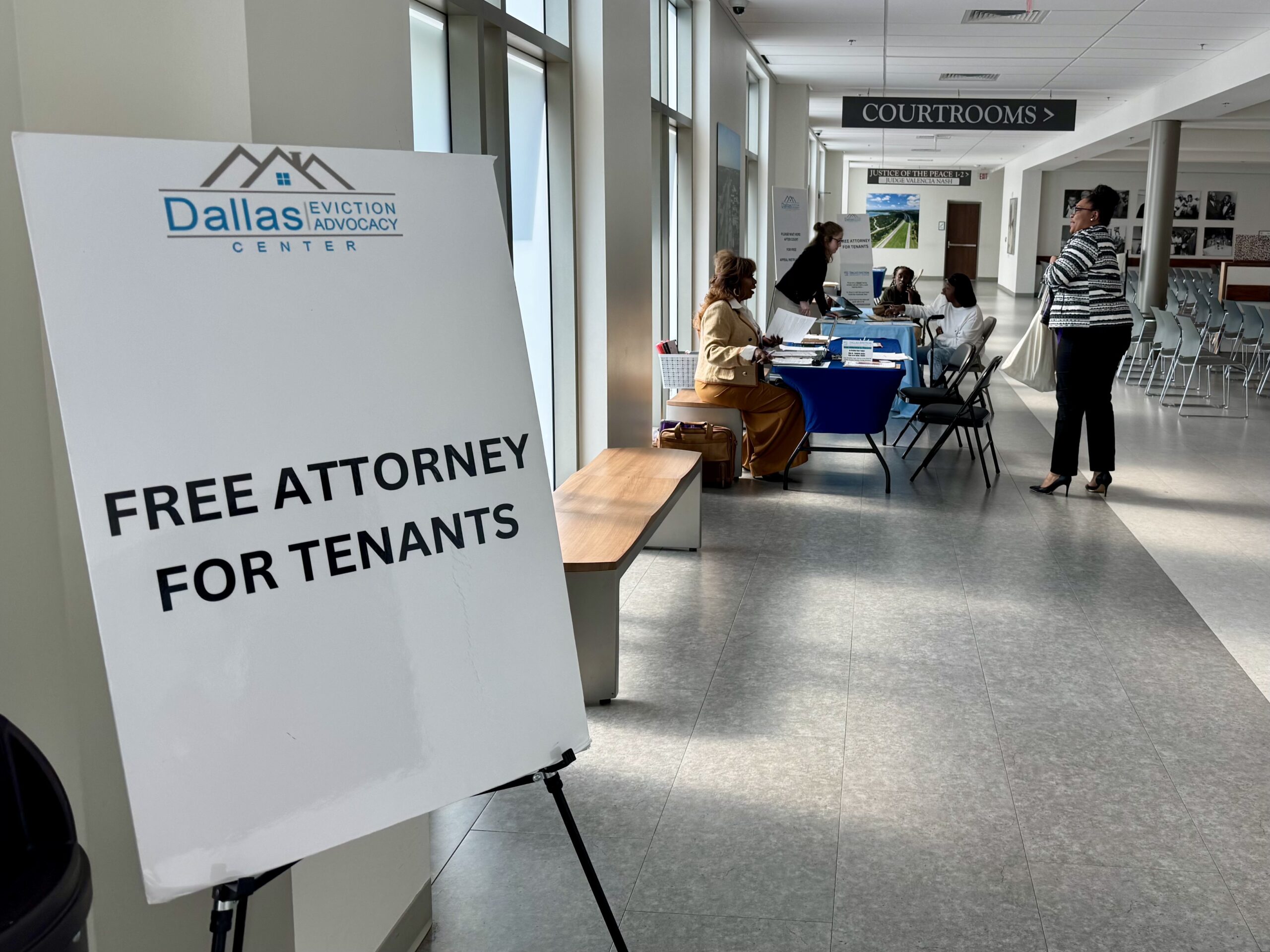A cheerful “Good morning” from legal assistant Lisa Frazier Galloway drew a man wandering the hall to the Dallas Eviction Advocacy Center table inside the South Dallas Government Center.
On this Tuesday morning, the man had gone alone to the justice of the peace to face his eviction hearing.
“We’re free if you’re interested,” Galloway said, explaining that the advocacy center provides attorneys to represent tenants in court the same day. From under the brim of a blue ballcap, the man’s eyes widened and he nodded.
Galloway handed him a signup sheet while beckoning a woman who was also seeking help to the side of the table. Huffing silently, the woman shared that she has children, a 1-year-old and a five-month-old, and barely made it to court.
“Is it a house, sir?” Galloway asked the man she was still helping. He nodded. She turned back to the woman. “Did you receive a notice to vacate?”
Galloway wasted no time — court was to begin in a matter of minutes — but she kept calm and inviting.
By the time Justice of the Peace Thomas G. Jones took the bench, Galloway and the two advocacy center lawyers staffing the hallway outside his court netted each tenant who showed up to court that morning — about a dozen total.
This is the center’s “saturation theory” in action. Its staffers intercept tenants as they arrive at eviction court to saturate the system with quality eviction defense lawyers who ensure that landlords are not unlawfully evicting people.
The center, founded by Holland & Knight partner Mark Melton, hit a major milestone this week. For the first time, the center is staffing each of the county’s 10 eviction courts every day of the week.
“If you can fully saturate these courts, then you can change the whole dynamic between landlords and tenants,” Melton said.

Full saturation has been a dream of his, Melton said. But he struggled to muster excitement Monday afternoon as he drove to his Dallas home from Austin, where a bill, backed by the Texas Apartment Association, is making its way through the Texas Legislature that would scale back existing due process and judicial oversight for evictions.
Melton wrote about the legislation for The Texas Lawbook. He has gone back-and-forth to Austin to testify against House Bill 32 and its companion, Senate Bill 38, and to meet with lawmakers in an attempt to shore up support. The legislation’s supporters have said the bills are aimed at so-called squatters, people who occupy property without any legal claim, a narrative opponents have challenged by pointing to existing legal statutes that address squatters.
“It’s a little bittersweet to reach this milestone, which we’ve been working on for five years, while at the same time trying to play defense and make sure the organization survives and continues to thrive,” Melton said.
Melton started his initiative in March of 2020 as the Covid-19 pandemic shut down many businesses, suddenly putting people out of work and making rent money hard to come by. Melton recruited 250 volunteer lawyers and helped about 6,500 households.
Melton launched the nonprofit advocacy center with his wife, Lauren Melton, in January 2021. With two paid staff lawyers, they won 96 percent of the 853 eviction trials litigated that year. That’s largely because most landlords weren’t following the eviction process spelled out under the law while justices of the peace were largely rubber stamping their evictions, Melton said.
That win rate has declined to about 66 percent. Most lawyers would probably balk at a win rate in such decline. But not Melton, because the decline shows that landlords are more often following the letter of the law, he said.
“Our stated goal has always been that we need to get to the place where we lose every single case, because we have trained the landlord community by beating them in court to do it right,” Melton said.
The center now has 25 employees and a $2.4 million operating budget.

